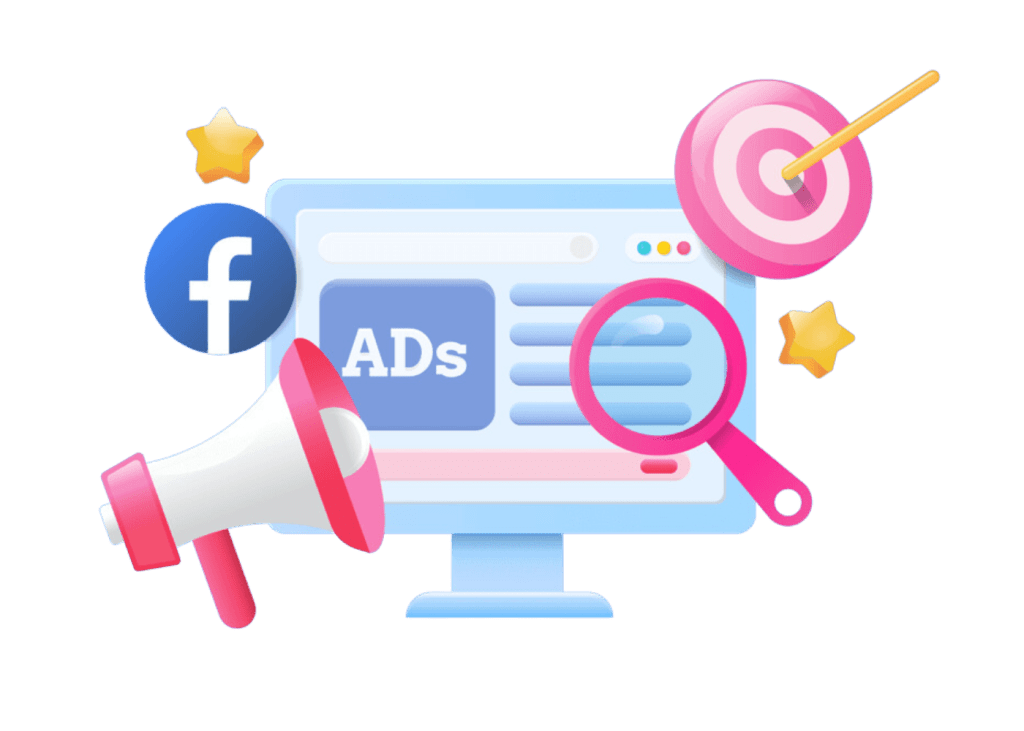Facebook provides robust analytical tools to track key metrics such as impressions, clicks, conversions, and ROI, allowing businesses to measure the success of their ad campaigns accurately.
I will setup Profitable Ecommerce Facebook Ads for 10x boost your Business
Hi Dear Business Owner,
- Are you having trouble running a Facebook Ads campaign?
- Can’t achieve your goals?
- Do you want to increase sales through Facebook ads campaigns?
So are you looking for a best real estate facebook ads Agency to increase your business sales through profitable Facebook and Instagram ads campaign?
Don’t worry more. Professional Facebook Marketing & Advertising is the only way to your Ecommerce Business. We can increase your business through Facebook and Instagram ads Marketing

I will for you:
- Setup FB ads & Instagram ads campaign
- Boost Shopify, WooCommerce WordPress Website
- Target Audience for your Niche
- Analyze Campaign Metrics (CPM, CPC, CPA, ROAS etc.)
- FB Pixel Installation API.
- Lookalike Audience & Re-Targeting.
- 10x Boost your sales or service

Its Benefits you will get:
- Advertise to more people at a lower cost
- More sales for low-cost
- Conversion tracking
Do you want to see my Portfolio?
Then Please see my Project
Let’s help you reach your business goals.
Thank You
Benefit Ecommerce Facebook Ads Agency for your Ecommerce Business
Using a Facebook Ads Agency for your ecommerce business means expertly crafted ads, precise targeting, and efficient spending, ultimately boosting sales and brand visibility hassle-free.
Need Ecommerce Facebook ads Agency for your eCommerce Business?
Our Process
Easy Steps To
Get Your Solution
Book A Service
Start Consultation
Check Your Growth
Benefits of Facebook Ads for Ecommerce Businesses
“In today’s competitive digital landscape, ecommerce businesses are constantly seeking innovative ways to expand their reach, attract new customers, and drive sales. Among the plethora of marketing strategies available, Facebook Ads for ecommerce stand out as a powerful tool for achieving these objectives. Leveraging the unparalleled reach and targeting capabilities of Facebook’s advertising platform can significantly boost the success of ecommerce ventures. Let’s delve into the myriad benefits that Facebook Ads offer to ecommerce business.”
Increased Reach and Visibility:
Targeted Audience
Facebook boasts over 2.8 billion monthly active users, offering ecommerce businesses access to a vast audience pool. With precise targeting options based on demographics, interests, behaviors, and more, businesses can effectively reach their ideal customers.
Brand Awareness
By strategically placing ads in users’ newsfeeds, Facebook enables ecommerce businesses to enhance their brand visibility. Consistent exposure to targeted audiences fosters brand recognition and familiarity, laying the groundwork for future conversions.
Cost-Effectiveness:
Budget-Friendly Options
Facebook Ads provide flexibility in budgeting, allowing businesses of all sizes to allocate resources according to their financial constraints. Whether operating on a shoestring budget or investing heavily in advertising, Facebook offers scalable solutions to suit diverse needs.
Pay-Per-Click Model
With Facebook’s pay-per-click (PPC) advertising model, businesses only pay when users engage with their ads. This cost-effective approach ensures that advertising expenditures align with tangible results, such as clicks, website visits, or conversions.
Precise Targeting:
Demographic Targeting
Ecommerce businesses can pinpoint their target audience based on demographics such as age, gender, location, and language preferences. This granular targeting capability ensures that ads are displayed to individuals most likely to be interested in the products or services offered.
Interest-Based Targeting
Facebook’s extensive data collection allows advertisers to target users based on their interests, hobbies, and online behaviors. By aligning ads with users’ preferences and affinities, businesses can maximize relevance and engagement.
Measurable Results:
Analytics and Insights
Facebook’s robust analytics tools provide valuable insights into ad performance, audience demographics, and engagement metrics. By monitoring key performance indicators (KPIs) such as click-through rates (CTR), conversion rates, and return on ad spend (ROAS), businesses can refine their advertising strategies for optimal results.
Conversion Tracking
Ecommerce businesses can track the entire customer journey, from initial ad interaction to final purchase, using Facebook’s conversion tracking feature. This enables precise attribution of conversions to specific ad campaigns, facilitating data-driven decision-making.
Enhanced Engagement:
Interactive Ad Formats
Facebook offers various ad formats, including carousel ads, video ads, and canvas ads, that encourage interactive engagement from users. Rich media formats captivate audiences and drive higher levels of engagement compared to traditional display ads.
Direct Communication
Through features like Messenger ads and chatbots, ecommerce businesses can establish direct lines of communication with potential customers. Personalized interactions and real-time assistance foster trust and credibility, nurturing relationships that lead to conversions.
Improved Conversion Rates:
Call-to-Action Buttons
Facebook Ads incorporate prominent call-to-action (CTA) buttons, such as “Shop Now” or “Learn More,” that guide users towards desired actions. Clear CTAs streamline the path to conversion, reducing friction and increasing the likelihood of purchase intent.
Seamless Checkout Process
By integrating with ecommerce platforms and payment gateways, Facebook facilitates a seamless checkout experience for users. In-app purchases and one-click ordering streamline the purchase process, minimizing cart abandonment and maximizing conversion rates.
Building Customer Relationships:
Community Engagement
Ecommerce businesses can cultivate a loyal customer base by fostering community engagement through Facebook Groups or Pages. Regular interactions, exclusive offers, and user-generated content strengthen brand affinity and encourage repeat purchases.
Customer Feedback
Facebook provides a platform for soliciting and responding to customer feedback, whether through comments, reviews, or direct messages. By actively listening to customer concerns and addressing them promptly, businesses demonstrate their commitment to customer satisfaction.
Competitive Advantage:
Keeping Up with Competitors
In a crowded marketplace, staying visible and competitive is paramount for ecommerce success. By leveraging Facebook Ads, businesses can stay ahead of the curve and capitalize on emerging trends before competitors do.
Adapting to Trends
Facebook’s advertising platform evolves continuously, introducing new features, targeting options, and ad formats. Ecommerce businesses that embrace innovation and adapt to changing trends can maintain relevance and stay competitive in the dynamic digital landscape.
Flexibility and Control:
Ad Scheduling
Ecommerce businesses have the flexibility to schedule ad campaigns according to peak shopping times, seasonal trends, or promotional events. Strategic ad scheduling ensures maximum impact and optimal utilization of advertising budgets.
Ad Placement
With Facebook’s extensive network of partner sites and apps, businesses can choose where their ads appear to maximize visibility and engagement. Whether in users’ newsfeeds, Instagram feeds, or within Messenger conversations, precise ad placement enhances targeting efficiency.
Scaling Opportunities:
Expanding Reach
As ecommerce businesses grow and evolve, Facebook Ads offer scalable solutions for expanding reach and acquiring new customers. Advanced targeting options and campaign optimization strategies enable businesses to scale their advertising efforts effectively.
Testing and Optimization
Facebook’s advertising platform facilitates A/B testing and performance optimization, allowing businesses to refine their ad creatives, messaging, and targeting parameters. Continuous experimentation and iteration drive incremental improvements in ad performance and ROI.
Enhanced Mobile Experience:
Mobile-Optimized Ads
Given the widespread use of mobile devices, Facebook Ads are optimized for seamless viewing and interaction on smartphones and tablets. Mobile-responsive ad formats ensure a consistent and engaging user experience across all devices.
In-App Purchases
Facebook’s integration with ecommerce platforms enables in-app purchases directly from Facebook Ads, providing a seamless shopping experience for users. When users click on an ad featuring a product or service, they can complete their purchase without leaving the Facebook app, streamlining the checkout process and reducing friction.
Integration with Other Platforms:
Cross-Platform Promotion
Ecommerce businesses can leverage Facebook Ads to promote their products or services across multiple digital channels. Integration with platforms such as Instagram, Messenger, and the Facebook Audience Network enables businesses to extend their reach beyond the Facebook platform and engage with users on different platforms and devices. Cross-platform promotion ensures consistent messaging and branding across all channels, maximizing exposure and increasing the likelihood of reaching target audiences wherever they are active online. By diversifying their advertising efforts and leveraging the unique features of each platform, businesses can amplify their marketing reach and drive more traffic to their ecommerce store.
Integration with CRM Systems
Facebook’s advertising platform supports integration with customer relationship management (CRM) systems, allowing ecommerce businesses to leverage their existing customer data for targeted advertising campaigns. By syncing customer information, such as email lists, contact details, and purchase history, with Facebook’s ad targeting tools, businesses can create highly personalized campaigns tailored to specific customer segments. Integration with CRM systems enables businesses to target existing customers with relevant offers, promotions, and product recommendations based on their past interactions and behaviors. By delivering personalized ad experiences to existing customers, businesses can drive repeat purchases, increase customer loyalty, and maximize the lifetime value of their customer base.
Case Studies and Success Stories:
Real-Life Examples:
Company A: Company A, an online fashion retailer, utilized Facebook Ads to promote its latest collection of clothing. By targeting users based on their interests in fashion and lifestyle, Company A achieved a significant increase in website traffic and sales. The campaign’s success was attributed to engaging ad creatives, strategic targeting, and timely promotions during key shopping seasons.
Company B: Company B, a subscription-based meal delivery service, leveraged Facebook Ads to reach health-conscious consumers interested in healthy eating options. Through targeted ads highlighting the convenience and nutritional benefits of their meal plans, Company B saw a notable increase in sign-ups and customer retention. The campaign’s success demonstrated the effectiveness of targeted messaging and addressing specific pain points of the target audience.
Best Practices:
Define Clear Objectives: Before launching a Facebook Ads campaign, clearly define your objectives, whether it’s increasing brand awareness, driving website traffic, or boosting sales. Establishing clear goals will guide your ad strategy and measurement of success.
Audience Segmentation: Segment your target audience based on demographics, interests, behaviors, and purchase history to deliver personalized ad experiences. Tailoring your messaging to specific audience segments increases relevance and engagement.
Compelling Ad Creatives: Create visually appealing and compelling ad creatives that capture users’ attention and convey your brand message effectively. Use high-quality images, engaging videos, and concise copy to communicate your value proposition and drive action.
A/B Testing: Experiment with different ad formats, targeting options, and messaging through A/B testing to identify what resonates best with your audience. Continuously optimize your campaigns based on performance data to maximize results.
Track and Analyze Performance: Monitor key performance indicators (KPIs) such as click-through rates (CTR), conversion rates, and return on ad spend (ROAS) to measure the effectiveness of your Facebook Ads campaigns. Use insights from analytics to refine your targeting, messaging, and ad creative for continuous improvement.
By following these best practices and drawing inspiration from real-life examples, ecommerce businesses can maximize the impact of their Facebook Ads campaigns and achieve their marketing objectives efficiently.
Conclusion:
In conclusion, Facebook Ads for ecommerce offer businesses a powerful platform to reach their target audience, increase brand visibility, and drive sales. Through features like precise targeting, cost-effectiveness, and integration with other platforms, businesses can create highly targeted and impactful advertising campaigns. Real-life examples and best practices demonstrate the effectiveness of Facebook Ads in achieving various marketing objectives.
By leveraging Facebook Ads effectively and following best practices, ecommerce businesses can stay ahead of the competition, adapt to changing trends, and build strong customer relationships. With continuous optimization and monitoring of performance metrics, businesses can maximize the ROI of their advertising efforts on Facebook. In today’s digital landscape, Facebook Ads remain an indispensable tool for ecommerce businesses looking to grow their online presence and drive revenue.
FAQ
Genera Question
Yes, Facebook Ads can be tailored to suit various types of ecommerce businesses, regardless of their size or industry.
Some best practices include defining clear objectives, targeting the right audience, using eye-catching visuals, crafting compelling ad copy, and testing different variations to optimize performance.
It's advisable to regularly refresh ad creatives to maintain audience interest and avoid ad fatigue. Testing new creatives and messaging can help keep campaigns fresh and engaging for the target audience.
Using a Facebook Ads Agency for your ecommerce business means expertly crafted ads, precise targeting, and efficient spending, ultimately boosting sales and brand visibility hassle-free.
